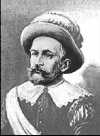 Peter Minuit was the director-general of the Dutch colony of New Netherland who is credited with the purchase of the island of Manhattan in 1626. According to legend, he persuaded the natives—perhaps a Metoac band of Lenape known as the Canarsee, who were actually native to what is now Brooklyn—to “sell” the island for a handful of trade goods worth approximately 60 guilders. In 1846, that price was converted by a New York historian to what US dollar amount? Discuss
Peter Minuit was the director-general of the Dutch colony of New Netherland who is credited with the purchase of the island of Manhattan in 1626. According to legend, he persuaded the natives—perhaps a Metoac band of Lenape known as the Canarsee, who were actually native to what is now Brooklyn—to “sell” the island for a handful of trade goods worth approximately 60 guilders. In 1846, that price was converted by a New York historian to what US dollar amount? Discuss
Source: The Free Dictionary
 Following the launch of the Soviet satellite Sputnik I in October 1957, there was a frenzied effort by the US to launch a satellite of its own, beginning the so-called Space Race. Launched in January 1958 as part of the US program for the International Geophysical Year project, Explorer-I was the first Earth satellite of the US. It contributed to the discovery of the Van Allen Belts but stopped transmission of data when its batteries died in 1958. It remained in orbit, however, for how long?
Following the launch of the Soviet satellite Sputnik I in October 1957, there was a frenzied effort by the US to launch a satellite of its own, beginning the so-called Space Race. Launched in January 1958 as part of the US program for the International Geophysical Year project, Explorer-I was the first Earth satellite of the US. It contributed to the discovery of the Van Allen Belts but stopped transmission of data when its batteries died in 1958. It remained in orbit, however, for how long?  Measuring 9.5 on the moment magnitude scale, the Great Chilean Earthquake was the most powerful earthquake ever recorded. The tsunami it produced sent waves of up to 82 ft (25 m) racing across the Pacific Ocean to Chile, Argentina, Hawaii, Japan, the Philippines, New Zealand, and the Aleutian Islands. It is estimated that between 2,000 and 6,000 people lost their lives in the earthquake and ensuing tsunami. The tsunami reached Japan how many hours after the initial earthquake?
Measuring 9.5 on the moment magnitude scale, the Great Chilean Earthquake was the most powerful earthquake ever recorded. The tsunami it produced sent waves of up to 82 ft (25 m) racing across the Pacific Ocean to Chile, Argentina, Hawaii, Japan, the Philippines, New Zealand, and the Aleutian Islands. It is estimated that between 2,000 and 6,000 people lost their lives in the earthquake and ensuing tsunami. The tsunami reached Japan how many hours after the initial earthquake? 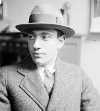 Now famously known as Leopold and Loeb, Nathan Leopold, Jr., and Richard Loeb were two University of Chicago students who murdered 14-year-old Bobby Franks in 1924 as part of an elaborate plan to commit the “perfect crime.” Although the duo attempted to conceal or destroy all evidence linking them to the crime, a pair of Leopold’s eyeglasses was found near the scene, and the two later confessed. Spared the death penalty, they were instead sentenced to life in prison plus how many years?
Now famously known as Leopold and Loeb, Nathan Leopold, Jr., and Richard Loeb were two University of Chicago students who murdered 14-year-old Bobby Franks in 1924 as part of an elaborate plan to commit the “perfect crime.” Although the duo attempted to conceal or destroy all evidence linking them to the crime, a pair of Leopold’s eyeglasses was found near the scene, and the two later confessed. Spared the death penalty, they were instead sentenced to life in prison plus how many years? 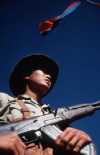 Fought over a period of 10 days in 1969, the Battle of Hamburger Hill was the last major US ground assault of the Vietnam War. Attacks on the heavily fortified hill were primarily carried out by infantry using small arms fire, with fighting akin to WWI trench warfare. The site was of little strategic value, and the high number of casualties that resulted from capturing it sparked controversy and led to dramatic changes in US strategy. How did the hill get its name?
Fought over a period of 10 days in 1969, the Battle of Hamburger Hill was the last major US ground assault of the Vietnam War. Attacks on the heavily fortified hill were primarily carried out by infantry using small arms fire, with fighting akin to WWI trench warfare. The site was of little strategic value, and the high number of casualties that resulted from capturing it sparked controversy and led to dramatic changes in US strategy. How did the hill get its name?  On May 19, 1780, an unusual darkening of the day sky was observed over parts of New England and Canada. The darkness was so complete that candlelight was needed as early as noon in places. Researchers examining scar damage in tree growth rings believe that a large fire in Canada’s Algonquin Provincial Park contributed to the darkness, but thick fog and cloud cover likely also played a role. The episode was, and still is, interpreted by many as what kind of event?
On May 19, 1780, an unusual darkening of the day sky was observed over parts of New England and Canada. The darkness was so complete that candlelight was needed as early as noon in places. Researchers examining scar damage in tree growth rings believe that a large fire in Canada’s Algonquin Provincial Park contributed to the darkness, but thick fog and cloud cover likely also played a role. The episode was, and still is, interpreted by many as what kind of event? 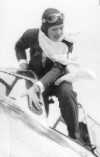 A pioneering American aviator, Cochran was the first woman to break the sound barrier and, in 1961, to fly at twice that speed. She was also the first woman to fly in the Bendix transcontinental race, which she won in 1938, a few years after her initial attempt. During WWII, she trained female transport pilots in the British and US Air Force auxiliaries and became the first woman to pilot a bomber across the Atlantic. A successful entrepreneur, Cochran learned to fly to promote her line of what?
A pioneering American aviator, Cochran was the first woman to break the sound barrier and, in 1961, to fly at twice that speed. She was also the first woman to fly in the Bendix transcontinental race, which she won in 1938, a few years after her initial attempt. During WWII, she trained female transport pilots in the British and US Air Force auxiliaries and became the first woman to pilot a bomber across the Atlantic. A successful entrepreneur, Cochran learned to fly to promote her line of what? 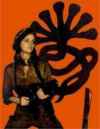 The Symbionese Liberation Army (SLA) was an American terrorist group responsible for various bank robberies, murders, and acts of violence between 1973 and 1975. The group is perhaps best known for kidnapping 19-year-old media heiress Patty Hearst, who later became a member of the SLA—a decision experts attribute to a psychological condition known as Stockholm syndrome—and participated in their heists. What happened to Hearst after police raided SLA headquarters in 1974, killing several members?
The Symbionese Liberation Army (SLA) was an American terrorist group responsible for various bank robberies, murders, and acts of violence between 1973 and 1975. The group is perhaps best known for kidnapping 19-year-old media heiress Patty Hearst, who later became a member of the SLA—a decision experts attribute to a psychological condition known as Stockholm syndrome—and participated in their heists. What happened to Hearst after police raided SLA headquarters in 1974, killing several members? 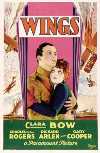 The Academy of Motion Picture Arts and Sciences was formed in 1927 by Louis B. Mayer and others to raise the standards of film production, and its first Academy Awards were presented not long after. Hosted by actor Douglas Fairbanks and director William C. DeMille, the first Academy Awards ceremony recognized individuals who had made outstanding film achievements in 1927 and 1928. The gold-plated statuettes given to awardees are popularly known as “Oscars.” How did they get this nickname?
The Academy of Motion Picture Arts and Sciences was formed in 1927 by Louis B. Mayer and others to raise the standards of film production, and its first Academy Awards were presented not long after. Hosted by actor Douglas Fairbanks and director William C. DeMille, the first Academy Awards ceremony recognized individuals who had made outstanding film achievements in 1927 and 1928. The gold-plated statuettes given to awardees are popularly known as “Oscars.” How did they get this nickname?  Inspired by the eagles he saw while out in the fields, Spanish inventor and aviation pioneer Diego Marín Aguilera built a flying machine from wood, iron, cloth, and feathers whose design was based on his observations of birds of prey. His attempt to fly the vehicle was somewhat successful—he reportedly reached a height of about 20 ft (6 m) and glided some distance—but he crash-landed when the device suffered a structural failure. What did the locals do when they learned of his invention?
Inspired by the eagles he saw while out in the fields, Spanish inventor and aviation pioneer Diego Marín Aguilera built a flying machine from wood, iron, cloth, and feathers whose design was based on his observations of birds of prey. His attempt to fly the vehicle was somewhat successful—he reportedly reached a height of about 20 ft (6 m) and glided some distance—but he crash-landed when the device suffered a structural failure. What did the locals do when they learned of his invention?